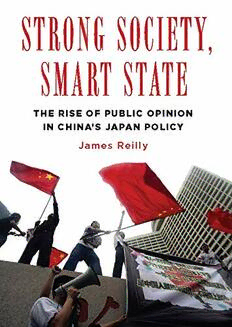
Strong Society, Smart State: The Rise of Public Opinion in China's Japan Policy PDF
Preview Strong Society, Smart State: The Rise of Public Opinion in China's Japan Policy
STRONG SOCIETY, SMART STATE CONTEMPORARY ASIA IN THE WORLD CONTEMPORARY ASIA IN THE WORLD David C. Kang and Victor D. Cha, Editors T his series aims to address a gap in the public-p olicy and schol- arly discussion of Asia. It seeks to promote books and studies that are on the cutting edge of their respective disciplines or in the promotion of multidisciplinary or interdisciplinary re- search but that are also accessible to a wider readership. The editors seek to showcase the best scholarly and public-p olicy arguments on Asia from any f eld, including politics, history, economics, and cultural studies. Beyond the Final Score: The Politics of Sport in Asia , Victor D. Cha, 2008 The Power of the Internet in China: Citizen Activism Online , Guobin Yang, 2009 China and India: Prospects for Peace , Jonathan Holslag, 2010 India, Pakistan, and the Bomb: Debating Nuclear Stability in South Asia , Šumit Ganguly and S. Paul Kapur, 2010 Living with the Dragon: How the American Public Views the Rise of China , Benjamin I. Page and Tao Xie, 2010 East Asia Before the West: Five Centuries of Trade and Tribute , David C. Kang, 2010 Harmony and War: Confucian Culture and Chinese Power Politics , Yuan- Kang Wang, 2011 JAMES REILLY STRONG SOCIETY, SMART STATE The Rise of Public Opinion in China’s Japan Policy J Columbia University Press New York Columbia University Press Publishers Since 1893 New York Chichester, West Sussex Copyright © 2012 Columbia University Press All rights reserved Library of Congress Cataloging- in- Publication Data Reilly, James, 1972– Strong society, smart state : the rise of public opinion in China’s Japan policy / James Reilly. p. cm. — (Contemporary Asia in the world) Includes bibliographical references and index. ISBN 978- 0- 231- 15806- 0 (cloth : acid- free paper paper) — ISBN 978- 0- 231- 52808- 5 (electronic) 1. China—Foreign relations—Japan. 2. Japan—Foreign relations— China. 3. Japan—Foreign public opinion, Chinese. I. Title. II. Series. DS740.5.J3R38 2012 327.51052—dc22 2010049310 Columbia University Press books are printed on permanent and durable acid- free paper. This book was printed on paper with recycled content. Printed in the United States of America c 10 9 8 7 6 5 4 3 2 1 R eferences to Internet Web sites (URLs) were accurate at the time of writing. Nei- ther the author nor Columbia University Press is responsible for URLs that may have expired or changed since the manuscript was prepared. For Wu Na with all of my love CONTENTS List of Figures ix List of Tables xi Acknowledgments xiii Introduction 1 1 Public Opinion in Chinese Foreign Policy 23 2 Forgetting and Remembering the Past: China’s Relations with Japan, 1949–1999 55 3 The Origins of Public Mobilization 99 4 Responding to Public Opinion 129 5 A Potent Populism 157 6 The Rebirth of the Propaganda State 179 Conclusion 207 Appendices 229 Notes 237 Bibliography 291 Index 315 FIGURES Figure 1.1 Stages in a Wave of Public Mobilization 27 Figure 3.1 Global Times Reporting on Japan 118 Figure 3.2 The Public’s “Friendly Feeling” Toward Japan 123 Figure 3.3 Ranking Japan’s Importance to China’s Economy 124 Figure 5.1 Variation in Chinese Experts’ Threat Perceptions of Japan 165 Figure 5.2 Percentage of Articles Urging Cooperation and Trust- building 165
